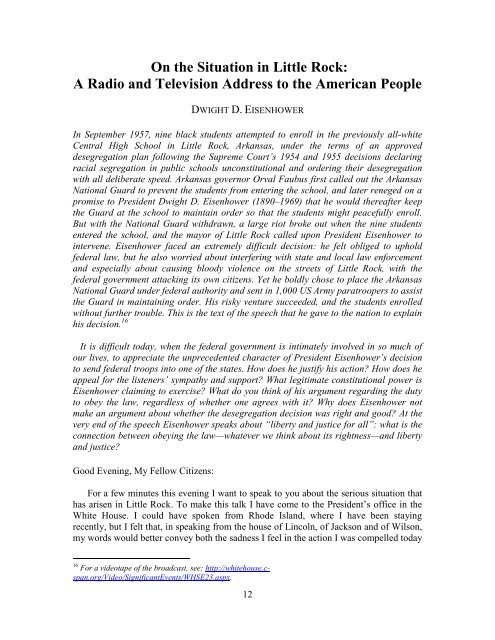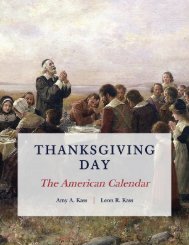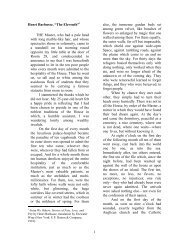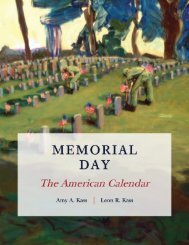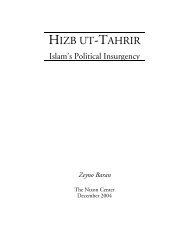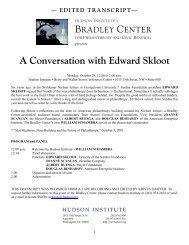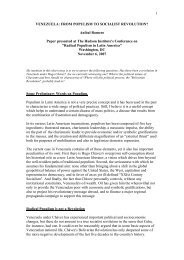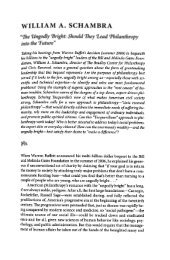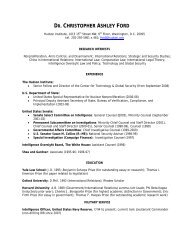Download PDF - Hudson Institute
Download PDF - Hudson Institute
Download PDF - Hudson Institute
You also want an ePaper? Increase the reach of your titles
YUMPU automatically turns print PDFs into web optimized ePapers that Google loves.
On the Situation in Little Rock:<br />
A Radio and Television Address to the American People<br />
DWIGHT D. EISENHOWER<br />
In September 1957, nine black students attempted to enroll in the previously all-white<br />
Central High School in Little Rock, Arkansas, under the terms of an approved<br />
desegregation plan following the Supreme Court’s 1954 and 1955 decisions declaring<br />
racial segregation in public schools unconstitutional and ordering their desegregation<br />
with all deliberate speed. Arkansas governor Orval Faubus first called out the Arkansas<br />
National Guard to prevent the students from entering the school, and later reneged on a<br />
promise to President Dwight D. Eisenhower (1890–1969) that he would thereafter keep<br />
the Guard at the school to maintain order so that the students might peacefully enroll.<br />
But with the National Guard withdrawn, a large riot broke out when the nine students<br />
entered the school, and the mayor of Little Rock called upon President Eisenhower to<br />
intervene. Eisenhower faced an extremely difficult decision: he felt obliged to uphold<br />
federal law, but he also worried about interfering with state and local law enforcement<br />
and especially about causing bloody violence on the streets of Little Rock, with the<br />
federal government attacking its own citizens. Yet he boldly chose to place the Arkansas<br />
National Guard under federal authority and sent in 1,000 US Army paratroopers to assist<br />
the Guard in maintaining order. His risky venture succeeded, and the students enrolled<br />
without further trouble. This is the text of the speech that he gave to the nation to explain<br />
his decision. 16<br />
It is difficult today, when the federal government is intimately involved in so much of<br />
our lives, to appreciate the unprecedented character of President Eisenhower’s decision<br />
to send federal troops into one of the states. How does he justify his action? How does he<br />
appeal for the listeners’ sympathy and support? What legitimate constitutional power is<br />
Eisenhower claiming to exercise? What do you think of his argument regarding the duty<br />
to obey the law, regardless of whether one agrees with it? Why does Eisenhower not<br />
make an argument about whether the desegregation decision was right and good? At the<br />
very end of the speech Eisenhower speaks about “liberty and justice for all”: what is the<br />
connection between obeying the law—whatever we think about its rightness—and liberty<br />
and justice?<br />
Good Evening, My Fellow Citizens:<br />
For a few minutes this evening I want to speak to you about the serious situation that<br />
has arisen in Little Rock. To make this talk I have come to the President’s office in the<br />
White House. I could have spoken from Rhode Island, where I have been staying<br />
recently, but I felt that, in speaking from the house of Lincoln, of Jackson and of Wilson,<br />
my words would better convey both the sadness I feel in the action I was compelled today<br />
16 For a videotape of the broadcast, see: http://whitehouse.cspan.org/Video/SignificantEvents/WHSE23.aspx.<br />
12


